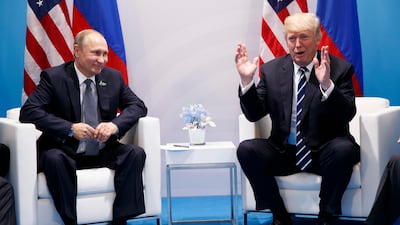Another week, another round of hysteria about the Trump circus. Shock: Ivanka briefly occupies her father's chair at the G20 summit in Germany. Horror: Donald Jnr met an obscure Russian woman who falsely claimed she had some beans to spill about the Clinton campaign last year.
It is beginning to feel as though there is something manufactured about the constant outrage. Facts are being made to fit a narrative. Angela Merkel, no less, pointed out that “the delegations themselves decide, should the president not be present for a meeting, who will then take over and sit in the chair. Ivanka Trump was part and parcel of the American delegation, so that is something that other delegations also do.”
As for claims of shenanigans with Russia, Mark Warner, vice chairman of the Senate Intelligence Committee, put it well last month. "There's a lot of smoke," he said, "but no smoking gun." Or as the Wall Street Journal's Kimberley Strassel has pointed out: there is thus far “no evidence” for what she described as the “fiction” of “Trump-Russia collusion”.
Amid all the recent fuss a highly upbeat note was struck by one of Mr Trump's tweets after his meeting with Vladimir Putin on the sidelines of the G20.
"We negotiated a ceasefire in parts of Syria which will save lives. Now it is time to move forward in working constructively with Russia!"
One might have thought the Russian and American leaders getting on, taking incremental steps to improve dire official relations, and recognising the value in working together rather than against each other, would be positive news.
Instead, there was yet more hand wringing and warnings from the large chorus of Washington commentators, senators and foreign policy sages who are reflexively anti-Russia (or anti-Putin, but that comes to the same thing for the foreseeable future).
This is not to ignore the allegations of Russian meddling in US elections. They are serious indeed.
Any realistic position would, however, have to take into account the fact that Mr Putin has been elected time and again. The size of his vote may have been boosted unfairly, but there's no doubt that he has won majorities and that he is Russia's legitimate and hugely popular ruler. If the possibility of forging friendly enough relations to "work constructively" with Russia was on the table, why would one not take that chance?
But there is a tendency of diehards in the US to desire confrontation with Russia and its leader.
The intellectuals and grandees of this tendency also warn so darkly about China's rise that they appear to want conflict in the Asia Pacific region, just as those who peddle the Clash of Civilisations narrative seem to want a war with Islam.
The less bellicose of us prefer to pose a simple question: wouldn't it be good if relations between the US and Russia improved?
Oh no, we are told. Russia is not America's friend. And maybe it hasn't been, although trying to encircle it with what Russians see as a hostile military alliance might have something to do with that. But maybe Trump and Putin could be friends. They both seem to want to be, and that could just work, because Trump isn't bothered by a lot of the human rights violations that Putin is accused of.
Trump's "new realism" is welcomed by many, and it is likely that that approach might extend to the Russian annexation of Crimea - especially if someone told him that it was part of Russia for nearly 200 years and its transfer within the Soviet Union was essentially an act of paperwork.
Again, many would be aghast at that. But Mr Trump is who he is, and Mr Putin is who he is, and we know that neither of them is likely to have a sudden personality transplant. Isn't it better that they get along?
Finally, it has been said that US presidents have often had good first meetings with Mr Putin, but the relationship soon deteriorates. Mr Trump and Mr Putin, on the other hand, have much in common. It may not work, but isn't it worth trying to see what could come from greater cooperation, maybe even a genuine friendship, between the leaders of Russia and America? I may be labelled a contrarian for suggesting so. What seems truly perverse to me is the presumption that suspicion, sanctions and spurning outreach is likely to produce a better result.
Sholto Byrnes is a senior fellow at the Institute of Strategic and International Studies, Malaysia

